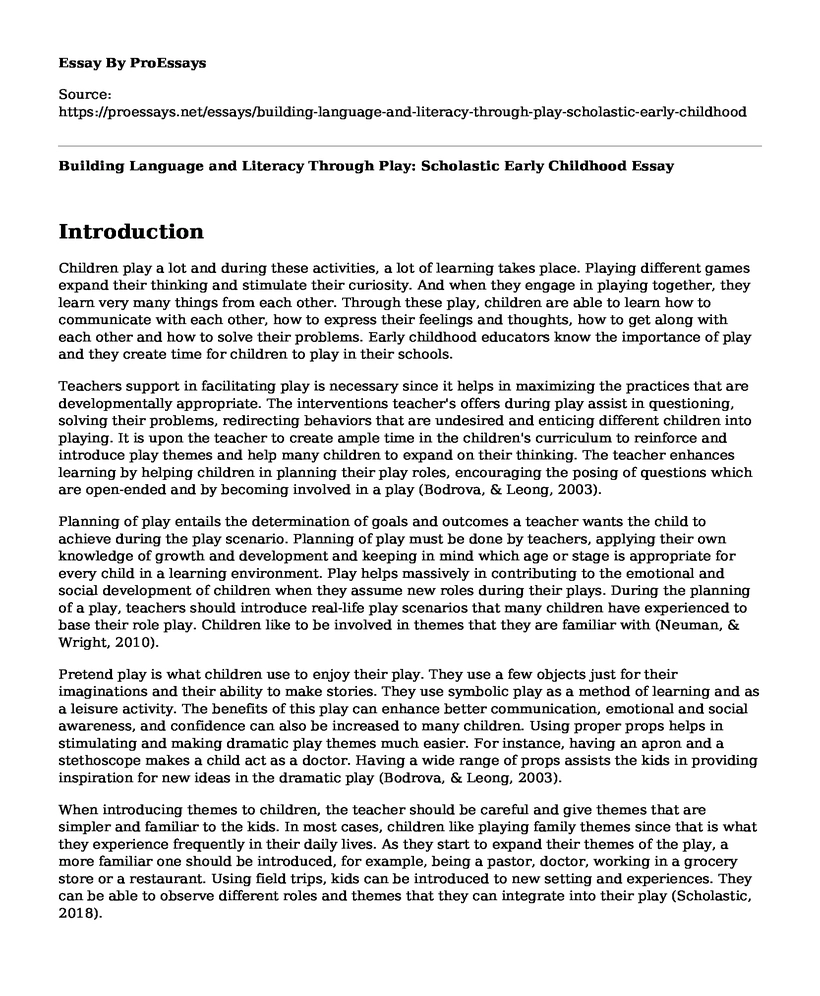Introduction
Children play a lot and during these activities, a lot of learning takes place. Playing different games expand their thinking and stimulate their curiosity. And when they engage in playing together, they learn very many things from each other. Through these play, children are able to learn how to communicate with each other, how to express their feelings and thoughts, how to get along with each other and how to solve their problems. Early childhood educators know the importance of play and they create time for children to play in their schools.
Teachers support in facilitating play is necessary since it helps in maximizing the practices that are developmentally appropriate. The interventions teacher's offers during play assist in questioning, solving their problems, redirecting behaviors that are undesired and enticing different children into playing. It is upon the teacher to create ample time in the children's curriculum to reinforce and introduce play themes and help many children to expand on their thinking. The teacher enhances learning by helping children in planning their play roles, encouraging the posing of questions which are open-ended and by becoming involved in a play (Bodrova, & Leong, 2003).
Planning of play entails the determination of goals and outcomes a teacher wants the child to achieve during the play scenario. Planning of play must be done by teachers, applying their own knowledge of growth and development and keeping in mind which age or stage is appropriate for every child in a learning environment. Play helps massively in contributing to the emotional and social development of children when they assume new roles during their plays. During the planning of a play, teachers should introduce real-life play scenarios that many children have experienced to base their role play. Children like to be involved in themes that they are familiar with (Neuman, & Wright, 2010).
Pretend play is what children use to enjoy their play. They use a few objects just for their imaginations and their ability to make stories. They use symbolic play as a method of learning and as a leisure activity. The benefits of this play can enhance better communication, emotional and social awareness, and confidence can also be increased to many children. Using proper props helps in stimulating and making dramatic play themes much easier. For instance, having an apron and a stethoscope makes a child act as a doctor. Having a wide range of props assists the kids in providing inspiration for new ideas in the dramatic play (Bodrova, & Leong, 2003).
When introducing themes to children, the teacher should be careful and give themes that are simpler and familiar to the kids. In most cases, children like playing family themes since that is what they experience frequently in their daily lives. As they start to expand their themes of the play, a more familiar one should be introduced, for example, being a pastor, doctor, working in a grocery store or a restaurant. Using field trips, kids can be introduced to new setting and experiences. They can be able to observe different roles and themes that they can integrate into their play (Scholastic, 2018).
Conclusion
Teachers and parents should appreciate the importance of play in a child's development. Proper time should be spared for children to play and enhance their learning and teachers should support their kids in their play scenarios. Parents must also be taught the value of play in a kid's life and they should encourage play by supporting the kid and offering playing materials.
References
Bodrova, E., & Leong, D. J. (2003). Chopsticks and Counting Chips: Do Play and Foundational Skills Need To Compete for the Teacher's Attention in an Early Childhood Classroom?. Young Children, 58(3), 10-17.
Neuman, S. B., & Wright, T. S. (2010). Promoting language and literacy development for early childhood educators: A mixed-methods study of coursework and coaching. The Elementary School Journal, 111(1), 63-86.
Building Language and Literacy Through Play | Scholastic. (2018). Scholastic.com. Retrieved 10 May 2018, from https://www.scholastic.com/teachers/articles/teaching-content/building-language-literacy-through-play/
Cite this page
Building Language and Literacy Through Play: Scholastic Early Childhood. (2022, Jun 04). Retrieved from https://proessays.net/essays/building-language-and-literacy-through-play-scholastic-early-childhood
If you are the original author of this essay and no longer wish to have it published on the ProEssays website, please click below to request its removal:
- Essay Example on Learning - Exams as a Measurement of Students' Abilities
- Summary of the Findings on Intercultural Competence of Teachers
- Do Primary School Impact Girls Creativity?
- Personal Statement for Admission to a PhD Program in Literature
- Ken Robinson's Presentation on "Do Schools Kill Creativity" Analysis Essay
- Tackling School Violence Paper Example
- Unlock Your Strengths: Essay on How Competition, Ideation, & More Can Help You







